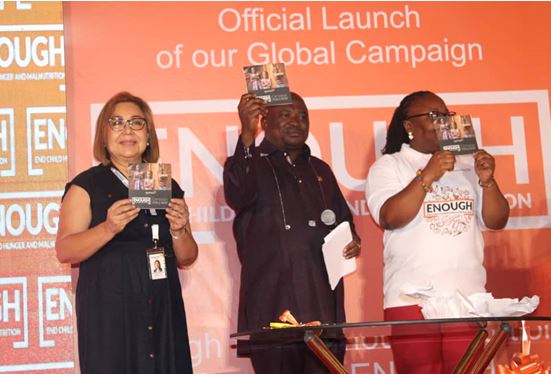– targets 12.5 million children in 3-years
By Ernest Bako WUBONTO
World Vision Ghana (WVG) has launched a mission to eradicate child hunger and malnutrition, seeking support and investment to ensure children receive proper nourishment and are saved from starvation – which is their fundamental human right.
To achieve this, the World Vision Ghana programme has launched a campaign dubbed ‘Enough: End Child Hunger and Malnutrition’, to ensure that every child enjoys enough nourishing food so they can thrive.
Per the Ghana Demographic and Health Survey (GDHS) 2022, the national stunting rate stands at 18 percent while the current rate of wasting stands at six percent, underweight at 12 percent and two percent of children under five are overweight.
Almost half – 49 percent – of children aged 6-59 months in Ghana are anaemic, with 28 percent experiencing mild anaemia, 20 percent moderate anaemia and one percent severe anaemia. This statistic is very high by World Health Organisation (WHO) standards.
The campaign’s main strategic goals include enabling children to be actively visible and heard in hunger, nutrition and food security-related policies at all levels, and ensuring more children benefit from the aforementioned through prioritised services.
Epected outcomes by end of the ‘Enough’ campaign, in 2027, include to influence at least four policy shifts in health and nutrition, food security, climate-smart agriculture and social protection; reach 12.5 million children through improved services and policy implementation; reach 1.3 million children directly with good nutritious food (household and in schools); and reach 3.5 million parents and caregivers with education on good agricultural practices, food security, climate change, hunger & nutrition, among others.
National Director-WVG, Laura Del Valle, speaking at the campaign launch in Accra reiterated that ‘Enough’ seeks to amplify multi-sectorial programmatic excellence, ensure data on child hunger and malnutrition is more visible & spelled out in relevant statistics and reports at all levels, and as well ensure children voices are heard to shape relevant decisions & policy processes around hunger, nutrition & food security at all levels.
“World Vision Ghana urges the government of Ghana and all relevant stakeholders to enact and enforce both existing and new policies, and boost investment to eradicate child hunger and malnutrition by taking the following measures.
“The time is now to provide: enough nutritious food to the children, ensure enough funding for hunger and nutrition, enough political will to tackle hunger and malnutrition, enough household food security, enough quality school meals for every child, and enough nutritious meals for every child,” she said.

She highlighted that WVG has undeniably made a significant impact on the well-being of children since its inception in Ghana during 1979, amassing extensive experience and expertise in various crucial areas including child protection programming, advocacy, food security, climate change, health and nutrition, water and sanitation among others.
“This has laid a strong foundation and enabled the environment for realising the ‘Enough’ campaign’s vision,” she said.
Deputy Minister of Health, Alexander Akwasi Acquah, on his part mentioned that over the years governments have diligently crafted and implemented policies aimed at enhancing maternal and child health while striving to reduce child malnutrition.
Despite potential implementation challenges, these efforts have significantly enhanced the well-being of children and warrant commendation.
He expressed his gratitude to WVG for the transformative initiative, assuring government will support the project to ensure that the most vulnerable children and their caregivers receive nutrition-appropriate food & cash assistance for survival.
He pledged to ensure all relevant state agencies related to the subject area come on board for effective delivery to meet targetted outcomes.
Malnutrition is the deficiencies or imbalances in a person’s intake of energy and nutrients due to inadequate diet or substandard care practices, such as limited access to quality health and nutrition services. It can lead to lifelong adverse physical and cognitive effects in young children.
In attendance were representatives from the Ministries of Health, Agriculture and Finance; Ghana Health Service and Ghana Education Service; and other state agencies as well as NGOs in the health, education and agriculture sectors who pledged their support for the programme.










